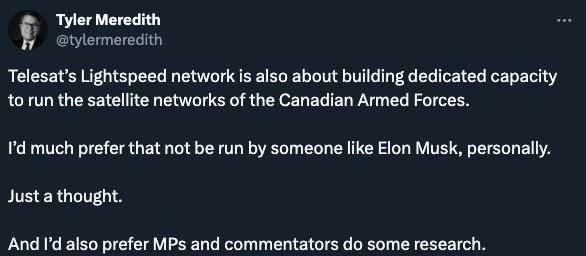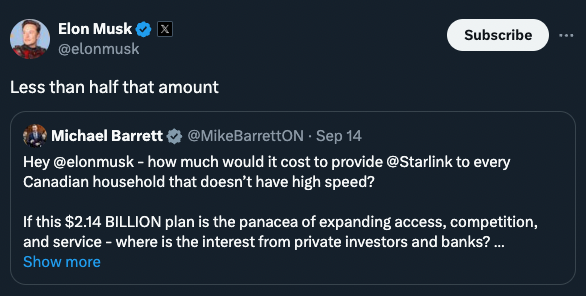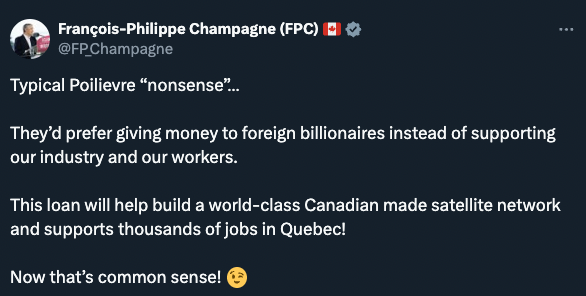The federal government’s recent commitment to a homegrown satellite communications company has kicked off a conversation about government spending, national sovereignty, and Elon Musk.
Ottawa-based satellite company Telesat secured a $2.14-billion CAD loan from the Canadian government and a $400 million loan from the Québec government last week. The combined financial boost totalling $2.54 billion CAD sparked a heated debate on X (formerly Twitter) over the weekend.
The funding, for what is believed to be Canada’s largest space program, is meant to boost Telesat’s completion of Lightspeed, a low-Earth-orbit (LEO) satellite network that promises to expand affordable and high-speed, internet, and 5G networks in remote and rural communities in Canada. Telesat has reportedly contracted aerospace technology firm MDA to build its satellites in Sainte-Anne-de-Bellevue, Québec.
“We won’t outsource our national security & we’ll have the network to protect Canada and the Arctic.”
Minister François-Philippe Champagne
In a press release, the government said the project will support “2,000 jobs across the country through Telesat and its supply chain.” It is also expected to create 967 jobs in Québec.
Telesat has pledged to invest over $4.4 billion in the Canadian economy over the next 15 years, create 200 post-secondary co-op jobs, and provide $1.6 million in scholarships to students in Canada with what the government says will focus on “women and Indigenous youth in science, technology, engineering, and math programs.”
Last week’s announcement sparked discussion online with some, including Conservative MP Michael Barrett, criticizing the move, suggesting that funding to bring internet to Canada’s rural areas could have been given to Elon Musk’s Starlink instead. In a post, the Conservative MP asked Musk to join the discussion.
Others, including former head of fiscal policy for the minister of finance, Tyler Meredith, said they do not want to see Musk run the initiative adding the project is also “about building dedicated capacity to run the satellite networks of the Canadian Armed Forces.”

Musk’s potential involvement in military-linked Canadian telecommunications infrastructure comes at the same time people in the United States (US) are calling for a Secret Service investigation into his security clearance following a controversial X post. In it, the tech founder questioned why former US President Trump has had two assassination attempts while US President Joe Biden and Vice President Kamala Harris have not had any.
One day prior, Musk chimed in on X to claim that it would take Starlink “less than half that amount” to bring high-speed internet to Canadian households. MP Barrett later called Elon’s response a “common sense solution for Canada.”

Canada’s Minister of Innovation, Science and Industry François-Philippe Champagne, pushed back to denounce Barrett’s X posts as “nonsense.” He insisted the Telesat loans would “help build a world-class Canadian-made satellite network that supports thousands of jobs.”
“They’d prefer giving money to foreign billionaires instead of supporting our industry and our workers,” the minister said in a pinned X post.

“We won’t outsource our national security & we’ll have the network to protect Canada and the Arctic,” the minister clarified in a separate post.
The Telesat Lightspeed program is already underway and the first of an initial 198 LEO satellites are scheduled to launch in 2026. Notably, Telesat has contracted launch agreements with Musk’s SpaceX for Lightspeed.
The initiative is part of the government’s target to ensure 98 percent of Canadians have access to high-speed internet by 2026 and 100 percent of Canadians get internet by 2030, the feds said in the release.
Feature image courtesy Justin Trudeau via LinkedIn.


